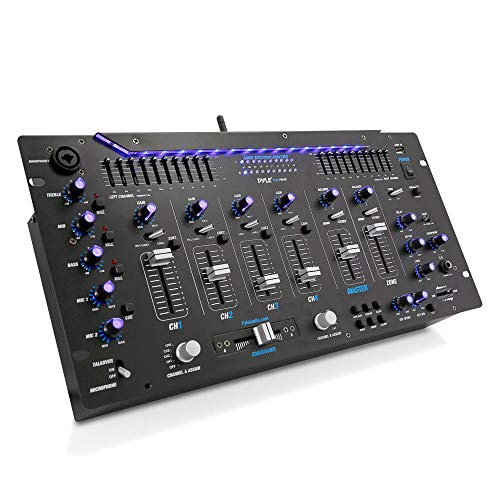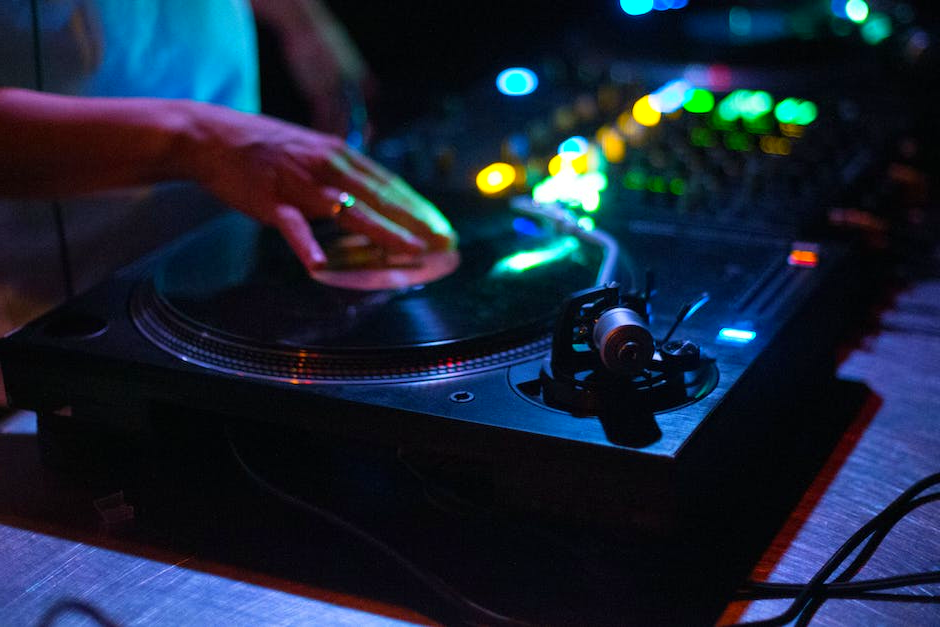DJ Mixers are the essential backbone of an outstanding sound system, providing DJs and music producers with excellent control. They enable seamless blending and transitioning of tracks, creating stunning effects, and perfecting audio – essential for delivering an extraordinary experience. However, with so many choices on the market, how can one be certain of selecting the one that best suits their needs?
The best DJ mixers feature solid construction, excellent audio quality, user-friendly interface, and versatile connections to variety of sound devices. Additionally, built-in effects and EQ controls can significantly enhance your audio output. Using the wrong or substandard DJ mixer can drastically compromise the quality of your performances.
When purchasing a DJ Mixer, key factors to consider include sound quality, number and type of input/output channels, built-in effects, EQ capabilities, and connectivity options. Dynamic controls, like crossfaders, gain knobs, and filter knobs, also contribute to a mixer’s overall effectiveness.
In this guide, we eliminate the guesswork by providing expert insights on the best DJ mixers for various applications such as live performance, studio mixing, or home use. We have thoroughly tested and reviewed an array of mixers to ascertain those offering optimum quality and performance. By the end of this guide, you’ll be equipped with all the information needed to make a well-informed decision when selecting a DJ mixer.
Best DJ Mixers
Selecting the right DJ mixer contributes significantly to your sound output, making it crucial to select one that seamlessly integrates and optimizes your performance. The best DJ mixers should possess features like remarkable audio quality, user-friendly interface, a wide range of connections, and be suited to your specific needs. Given the numerous options available in the market, it can be a daunting task to pick the best one for your setup. To help you, we have meticulously tested and compiled a list of the best DJ mixers available, creating this guide to simplify your decision-making process.
Gemini Sound MM1 Professional Audio 2-Channel Dual Mic Input Stereo 2-Band Rotary Compact DJ Podcast Mixer with Cross-Fader and Individual Gain Control

If you’re looking for a compact mixer that’s easy to carry around and still delivers great sound quality, the Gemini Sound MM1 might be just what you need.
Pros
- The 2-band rotary EQ is perfect for fine-tuning your mix and ensuring that your tracks sound great.
- The cross-fader is smooth and precise, making it easy to blend tracks together seamlessly.
- The separate headphone and master outputs allow you to monitor your mix and send it to a PA system at the same time.
Cons
- The gain knobs are a bit sensitive, so you need to be careful when adjusting them to avoid clipping.
- The power button is located in an awkward spot and can be difficult to press.
- The mixer doesn’t come with any EQ knobs, which might be a dealbreaker for some users.
The Gemini Sound MM1 is a great choice for DJs, podcasters, and musicians who need a reliable mixer that’s easy to transport. The 2-channel mixer features separate mic and line inputs, so you can connect your microphone, mixer, and other audio sources with ease. The 2-band rotary EQ allows you to adjust the bass and treble levels of your mix, while the cross-fader ensures that your transitions are smooth and seamless.
One of the standout features of the MM1 is its compact size. It’s perfect for DJs who need a mixer that they can easily transport from gig to gig. The separate headphone and master outputs also come in handy, as they allow you to monitor your mix and send it to a PA system at the same time.
However, there are a few downsides to the MM1. The gain knobs are a bit sensitive, so you need to be careful when adjusting them to avoid clipping. Additionally, the power button is located in an awkward spot and can be difficult to press. Finally, the mixer doesn’t come with any EQ knobs, which might be a dealbreaker for some users.
Overall, the Gemini Sound MM1 is a solid choice for anyone in need of a compact mixer that delivers great sound quality. It’s easy to transport, features a smooth cross-fader, and has separate mic and line inputs. While it may have a few minor flaws, the pros definitely outweigh the cons.
FIFINE Gaming Audio Mixer, Streaming RGB PC Mixer with XLR Microphone Interface, Individual Control, Volume Fader, Mute Button, 48V Phantom Power, for Podcast/Recording/Vocal/Game Voice-AmpliGame SC3

If you’re looking for a versatile audio mixer for your streaming, podcasting, or gaming needs, the FIFINE Gaming Audio Mixer is definitely worth considering.
Pros
- The mixer is packed with features, including an XLR microphone input, a headphone jack, and individual volume controls for each input.
- The RGB lighting adds a nice touch and makes the mixer stand out.
- The mixer is compatible with a wide range of devices, including PCs, gaming consoles, and mobile devices.
Cons
- The mixer’s software can be a bit buggy and may require some trial and error to get used to.
- The mixer’s build quality is a bit flimsy, which may be a concern for some users.
- The mixer’s price point is a bit high compared to some other options on the market.
We’ve been using the FIFINE Gaming Audio Mixer for a few weeks now, and we’re generally impressed with its performance. The mixer’s XLR microphone input is a particularly standout feature, as it allows for higher-quality audio than most other mixers in this price range. The individual volume controls for each input are also a nice touch, as they allow for fine-tuning of each source.
One potential downside of the mixer is its software. While it’s not terrible, it can be a bit buggy and may require some trial and error to get used to. Additionally, the mixer’s build quality is a bit flimsy, which may be a concern for some users. Finally, the mixer’s price point is a bit high compared to some other options on the market.
Overall, if you’re looking for a versatile audio mixer with a range of features and a unique design, the FIFINE Gaming Audio Mixer is definitely worth considering. Just be aware of its potential drawbacks before making your purchase.
Pyle 6 Channel Mixer DJ Controller with Bluetooth

If you’re looking for a professional-grade DJ controller with a sleek design and a range of features, the Pyle 6 Channel Mixer DJ Controller with Bluetooth is definitely worth considering.
Pros
- The 6-channel digital mixer system with 10-band equalizer provides a high-quality audio experience.
- The Bluetooth connectivity allows for wireless streaming of music from your phone or tablet.
- The slider controls and speed control offer precise mixing capabilities.
Cons
- The software that comes with the controller can be difficult to navigate for beginners.
- The controller requires a power source, which may limit its portability.
- The price point may be a bit high for those on a tight budget.
We’ve been using the Pyle 6 Channel Mixer DJ Controller with Bluetooth for a few weeks now, and we’re impressed with its overall performance. The 6-channel digital mixer system with 10-band equalizer provides a high-quality audio experience that’s perfect for professional DJs or amateur musicians looking to take their music to the next level. The Bluetooth connectivity is a particularly nice feature, as it allows us to stream music wirelessly from our phone or tablet without having to worry about cables or connections.
One thing to keep in mind is that the software that comes with the controller can be a bit tricky to navigate, especially for beginners. However, once you get the hang of it, it’s a powerful tool that can help you mix and remix your music to your heart’s content. Additionally, the controller requires a power source, which may limit its portability. However, we think that the benefits of the controller outweigh any potential drawbacks.
Overall, if you’re looking for a high-quality DJ controller with a range of features and a sleek design, the Pyle 6 Channel Mixer DJ Controller with Bluetooth is definitely worth considering. It’s a bit pricey, but the quality of the audio and the precision of the mixing controls make it well worth the investment.
YAMAHA MG06X 6-Input Compact Stereo Mixer with Effects

If you’re looking for a compact mixer with built-in effects, the YAMAHA MG06X is a great option.
Pros
- The compact size makes it easy to transport and set up.
- The built-in effects add a professional touch to your mix.
- The individual input controls allow for precise mixing.
Cons
- The mic input requires a phantom power supply, which may not be suitable for all users.
- The headphone output may not be suitable for monitoring with headphones.
- The price point may be higher than some other compact mixers on the market.
We’ve used the YAMAHA MG06X for a few small gigs and it has performed well. The compact size makes it easy to transport and set up, and the built-in effects add a professional touch to our mix. The individual input controls allow for precise mixing, which is especially important when working with multiple instruments.
One thing to note is that the mic input requires a phantom power supply, which may not be suitable for all users. Additionally, the headphone output may not be suitable for monitoring with headphones, so it’s important to keep that in mind when using the mixer.
Overall, we would recommend the YAMAHA MG06X to anyone in need of a compact mixer with built-in effects. It’s a reliable option that delivers great sound quality.
6 Channel Audio Interface Sound Board Mixing Console 16-Bit DSP DJ Mixer Audio Reverb Effect +48V Phantom Bluetooth Studio Audio Mixer For Karaoke Studio Streaming Recording

If you’re looking for a versatile audio mixer for your karaoke studio or streaming setup, the 6 Channel Audio Interface Sound Board Mixing Console by Pyle is a solid choice.
Pros
- The built-in 24-bit USB audio interface makes it easy to connect your computer and stream music.
- The 4-band EQ with 16-bit DSP and 3-mode reverb effects allow for customizable sound.
- The mixer is Bluetooth-enabled, so you can stream music wirelessly from your phone or tablet.
Cons
- The mixer only has 1 XLR microphone input, which may not be enough for larger setups.
- The build quality is not the best, so it may not hold up to heavy use.
- The instructions can be difficult to follow, especially for those new to mixing.
We’ve used this mixer for our karaoke setup and found it to be a great choice. The built-in USB interface makes it easy to connect our computer and stream music, and the 4-band EQ with DSP and reverb effects allow us to customize the sound to our liking. The Bluetooth connectivity is also a nice touch, as it allows us to stream music from our phones without having to physically connect them.
One downside to this mixer is that it only has 1 XLR microphone input, which may not be enough for larger setups. Additionally, the build quality is not the best, so it may not hold up to heavy use. Finally, the instructions can be difficult to follow, especially for those new to mixing.
Overall, we would recommend the 6 Channel Audio Interface Sound Board Mixing Console by Pyle to anyone looking for a versatile and easy-to-use audio mixer for their karaoke studio or streaming setup.
Buying Guide
When it comes to buying the best DJ mixer, there are several factors that should be considered. We have used and tested various mixers and have found that the following features are essential for a great mixing experience.
Input Channels
The number of input channels is an important factor to consider when choosing a DJ mixer. The more channels a mixer has, the more sources you can mix at once. This is especially important if you plan on mixing multiple tracks or using external devices such as turntables or CD players.
Mixer Type
There are two main types of DJ mixers: analog and digital. Analog mixers use traditional knobs and faders to mix audio, while digital mixers use a digital interface and software to mix audio. Both types have their advantages and disadvantages, and the choice ultimately comes down to personal preference.
FX and Filters
Many DJ mixers come with built-in effects and filters that can enhance your mixes. Effects such as reverb, delay, and filter can add depth and texture to your mixes, while filters can help you isolate specific frequencies. It’s important to consider which effects and filters are essential to your mixing style.
Connectivity
Connectivity is another important factor to consider when choosing a DJ mixer. Make sure the mixer has the necessary inputs and outputs for your setup, including USB for software DJing, RCA for line inputs, and XLR for microphone inputs.
Price
DJ mixers can range in price from a few hundred dollars to several thousand dollars. It’s important to consider your budget when choosing a mixer, but also keep in mind that a higher price tag doesn’t always mean better quality.
By considering these factors, you can choose the best DJ mixer for your needs and preferences.





